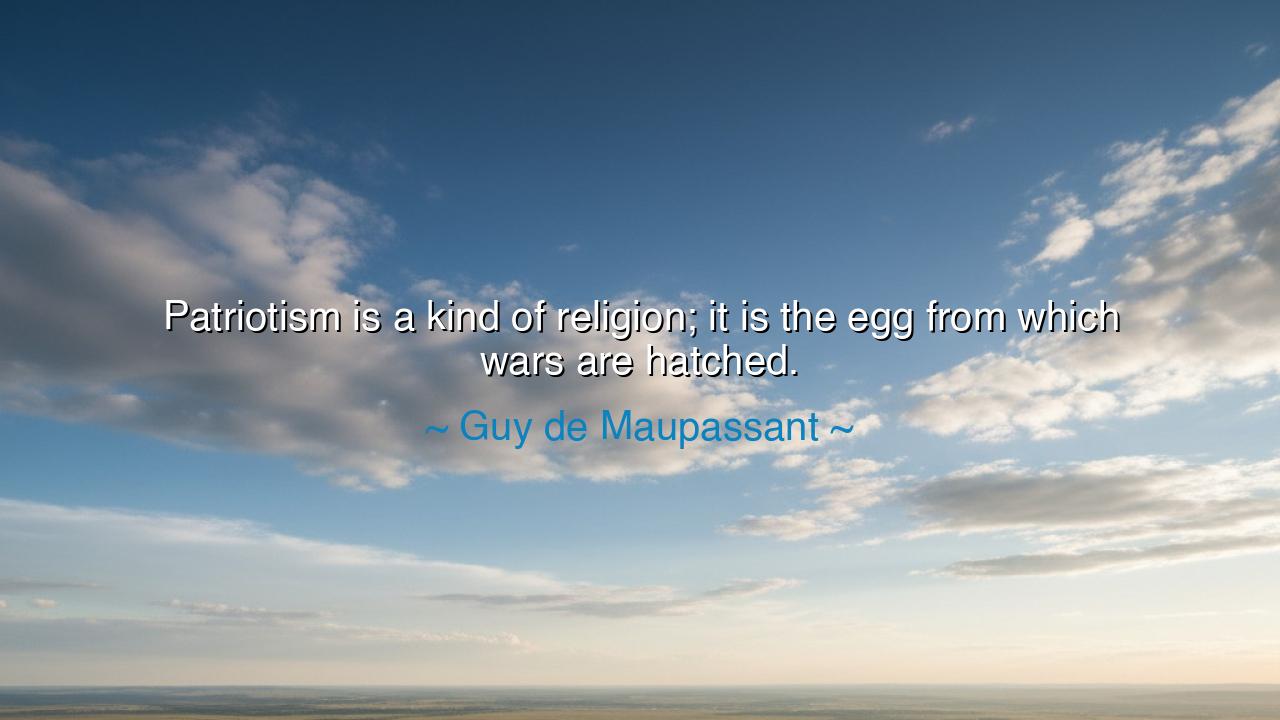
Patriotism is a kind of religion; it is the egg from which wars






The words of Guy de Maupassant—“Patriotism is a kind of religion; it is the egg from which wars are hatched.”—fall like a warning across the centuries. They are not the words of a dreamer untouched by the violence of his age, but of a man who lived in the shadow of Franco-Prussian conflict and saw how fervent national pride could harden into bloodshed. Maupassant likens patriotism to a religion, for it demands loyalty, inspires devotion, and binds the hearts of men. Yet, he warns, such devotion can also be blinding. From its shell may emerge not peace and brotherhood, but the fury of war, born of rivalry and exalted pride.
At the heart of this saying lies the paradox of human devotion. Just as religion can lift souls toward the heavens or bind them in fanaticism, so too patriotism can nurture unity or unleash destruction. The love of one’s homeland is natural, even noble; but when it becomes exalted above reason, it breeds suspicion of the foreigner, hatred of the neighbor, and the cry for conquest. Thus Maupassant’s metaphor is sharp: in every egg of patriotism lies the potential for new life or for violence, depending on what is hatched from its shell.
History gives us a vivid testimony. The First World War, which Maupassant did not live to see but which his warning foreshadowed, was born largely of inflamed national pride. Nations exalted their banners and glorified their armies, believing their cause divinely sanctioned. Millions marched to their deaths, not merely for survival, but under the conviction that their patriotism demanded it. Here was Maupassant’s prophecy fulfilled: religion-like devotion to the nation cracked open into catastrophe, birthing a war that scarred the world.
Yet even earlier, the same truth can be traced. In the Crusades, zeal for God was fused with zeal for homeland, and the holy war was waged in the name of both. Kings and warriors clothed themselves in symbols of faith and flag, stirring masses into action. They believed they were serving righteousness, but the fields of the Levant became rivers of blood. Maupassant’s insight reminds us that when devotion—whether to God or to country—becomes unquestioning, it can serve as a spark for endless conflict.
The ancients, too, recognized this danger. Thucydides, in chronicling the Peloponnesian War, showed how love of Athens and Sparta, once noble, transformed into rivalry that destroyed both. He revealed how patriotism became a banner under which ambition and greed marched, and how cities fell not merely to the spear of the enemy, but to the blindness of their own fervor. Maupassant stands in this lineage of wisdom: to remind us that unchecked devotion, even to noble things, can hatch destruction.
The lesson for us is both sobering and necessary. We must not abandon patriotism, for love of one’s homeland can inspire service, sacrifice, and unity. But we must temper it with reason, humility, and justice. We must beware of leaders who exploit patriotic fervor as priests of a false religion, turning devotion into fanaticism. True patriotism must remain grounded in compassion and respect, lest it hatch into hatred and war.
In daily life, this means practicing a patriotism that uplifts rather than destroys. Celebrate your nation, but never despise another. Defend your homeland, but never dehumanize those across the border. Teach your children that love of country must walk hand in hand with love of humanity, or else it ceases to be love at all. In this way, the egg of patriotism may hatch not war, but peace, not hatred, but fraternity.
Thus let Maupassant’s words echo like a solemn warning: “Patriotism is a kind of religion; it is the egg from which wars are hatched.” Let us not destroy the egg, but guard what it nurtures. For if guided by wisdom, it may give birth to unity and justice; if left to zeal and pride, it may unleash the monster of war. The choice, as always, lies in the hands of the living, who must decide whether their devotion will heal or destroy.






AAdministratorAdministrator
Welcome, honored guests. Please leave a comment, we will respond soon